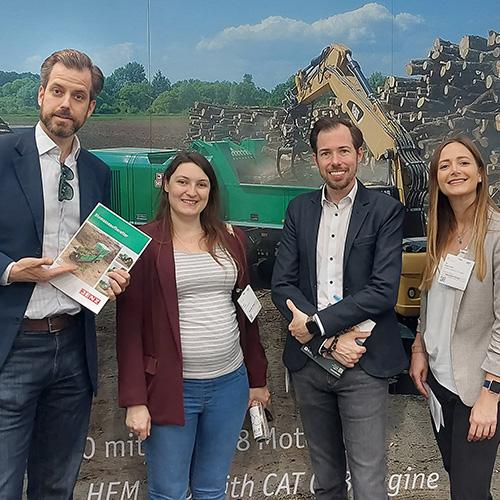
Early June marked the return of IFAT Munich, the world’s leading trade fair for water, sewage, waste and raw material management. With more than 2,900 exhibitors from 59 countries, including 49 startups and 119,000 visitors, IFAT demonstrated the importance of the circular economy and the trends that move the industry. A group of experts from COSMO Consult’s Environmental services group went to Munich to experience the latest trends and innovations firsthand.
With a wide variety of topics covered, we will start with sensors for waste management.
There is a sensor for that
Looking at modern waste management operations, a great deal of processes and machines are required to drive the circular economy. Trucks, bins, mobile equipment and even sorting and processing plants – all of these can provide valuable data to help companies in the industry to better understand and improve their business. It is not surprising that collecting relevant data with sensors was a common theme at IFAT this year.
Taking sensors for containers and bins as an example, these sensors have been on the market for several years and vendors at IFAT demonstrated that there is still room for innovation. Sensors are becoming smaller and more robust with technology moving towards a combination of modern ultrasonic and time-of-flight (ToF) sensors. These enable faster detection speed, greater accuracy and overall better three-dimensional fill-level detection, even for unevenly filled bins.
In addition to reading container fill levels, sensors can also detect lid openings and bin movement. This allows to identify vandalism or when bins are removed from their location. To further reduce the risk of theft, especially for higher-value assets, some vendors offer built-in GPS tracking capabilities. Furthermore, advancements in mobile connectivity allow sensors to include multiple communication technologies, enabling seamless, real-time communication even in remote areas.
However, there are also other applications for waste management sensors apart from fill-level detection and tracking. Talking to a startup from Austria, additional sensors may open entirely new ways for circular economy companies to differentiate themselves. Adding odor detection to their range of sensors, companies may identify smelly bins that could disturb the neighborhood, even when they are not full. These sensors may also be deployed in other scenarios, e.g. for companies offering facility services – detecting smelly bathrooms easily comes to mind.
Sensors clearly have found their place in waste management and can drive innovation. So, what is holding companies back to fully embracing sensors for everything?
Too expensive? Not necessarily
In the past, sensor prices have often been mentioned as a limiting factor for adoption. Talking to vendors and startups at IFAT, it is good to see that the increased competition in the field combined with reduced component costs has led to lower sensor prices overall, especially on larger volumes.
To further drive down costs, some companies have started offering full-service, rental based options for their sensors. This replaces a larger, up-front investment with smaller, monthly fees that also cover replacing broken sensors and allows scaling up or down as demand changes. Finding flexible models like this may be the key to driving a more comprehensive adoption of sensors in the industry.
Data to the cloud
With different vendors offering specialized sensors for different use cases (fill level readings, odor detection, weather data, etc.), waste management companies may find it easier to choose solutions from several providers to fulfill their needs. Talking to multiple companies at IFAT, it became clear that having a central platform to securely connect and analyze all sensor data together is key! This is where Microsoft Azure IoT (Internet of Things) offers a comprehensive set of tools to fulfill a wide range of IoT, big-data and analytics scenarios.
Providing better services to customers, lowering emissions and environmental impact, and producing better secondary resources, all with data at their fingertips, companies can truly get creative in transforming the waste management and recycling industry. We are excited to be part of this journey together with our customers in the circular economy!
Do you want to learn more about how sensors, business intelligence or machine learning can help you transform your business? Reach out to our experts and find your individualized solution.
Keywords
More similar blogposts:
Found what you were looking for?
Start your intelligent search now




